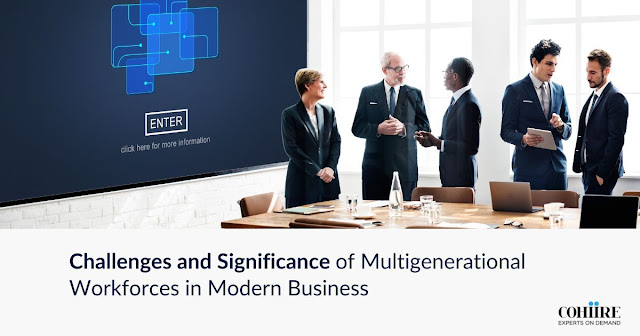One of the most
captivating narratives of today's dynamic business arena unfolds as
multigenerational perspectives and values converge within a workplace. The interplay
between Baby Boomers, Generation X, Millennials, and the newest Generation Z
has allowed this cross-generational tapestry that offers immense opportunities
and daunting challenges for organizations and the workplace.
Managing
multigenerational workforces sounds just as formidable as it pans out to be.
With these different generations working alongside each other, each cohort must
be willing to adapt their strategies to harness the strengths of the
others.
Understanding the
multigenerational workforce requires you to understand the generations at play.
Baby Boomers, born 1946-1964, bring immense experience, leadership, and strong
work ethics, but might come with limited technological proficiency. Generation
X, born 1965-1980, often require work autonomy and is celebrated for
adaptability. Born in 1981-1996, millennials are tech-savvy, driven individuals
who value work-life balance and are purpose-driven, seeking work that aligns
with their values. Lastly, the newest of the bunch, Generation Z, born after
1997, is tech-native, entrepreneurial, socially conscious, and is known as the
experience-seeking generation.
These
characteristics are generalizations, and individual variations exist within
each generation. However, generational ideals can primarily be identified as a
pattern and leveraged with the proper management techniques. Generational
conflict is a known issue. Traditionalists and new workers have very different
ideas about the nature of work, leading to misconceptions within a team.
Moreover,
generational differences can be more pronounced in some workplaces than others.
Organizations should focus on leveraging the strengths of each generation,
fostering open communication, and providing opportunities for professional
development that cater to the diverse needs and preferences of this varied set
of employees to manage a multigenerational workforce effectively.
Enter the concept
of "Flexi-CXOs" – leaders who embody a flexible, adaptive leadership
style that transcends generational boundaries. These leaders recognize the
importance of bridging generational gaps and creating an environment where
knowledge flows seamlessly from one generation to another. Flexi-CXOs foster
collaboration, encouraging each cohort to contribute their unique strengths,
ultimately propelling the organization to new heights.
Here are three
points that can help one navigate the scenario dominated by multigenerational
workforce
Capitalizing on Knowledge Transfer: A significant aspect to underscore is the
value of knowledge exchange within a multigenerational workforce. It's worth
noting that seasoned employees possess extensive industry-specific wisdom and
historical perspectives, which prove invaluable to their younger counterparts.
This intergenerational sharing not only bridges gaps in understanding but also
safeguards the retention of invaluable insights and experiences within the
organizational fabric.
The Adaptive Leadership of
Flexi-CXOs: Another pivotal
aspect to seamlessly incorporate into the fabric of today’s organizational
structures is the notion of "Flexi-CXOs" or leaders who exhibit an
adaptable, flexible leadership style. These leaders hold a pivotal role in
fostering cooperation and the seamless transmission of knowledge across
different generational cohorts. They transcend generational boundaries and
cultivate an atmosphere where the distinctive strengths of each group are not
only endorsed but harnessed, ultimately steering the organization toward
success.
Navigating
Generational Dynamics and Dispelling Misunderstandings: Furthermore, it's crucial to recognize the
potential hurdles stemming from disparities in generational perspectives,
including misunderstandings and conflicts. While generational norms follow
certain trends, it's vital to acknowledge the existence of individual
variations within each generation. Encourage organizations to remain cognizant
of these differences and actively cultivate open lines of communication while
offering tailored professional development opportunities that cater to the
diverse preferences and requirements of their multifaceted multigenerational
workforce. This insight underscores the importance of proactive management
strategies in effectively addressing these dynamics.


Comments
Post a Comment